- Fitch, the third largest U.S. rating agency, has just downgraded WeWork’s unsecured bonds to CCC.
- “A CCC rating represents an extremely high-risk bond or investment; banks are not allowed to invest in CCC-rated bonds. CCC bonds are junk bonds.”
- It will do no good to the coworking industry if such a high-profile company crashes and burns.
The reason why “Is WeWork going bust?” is a legitimate question to ask in December 2022 is that Fitch, the third largest U.S. rating agency, has just downgraded WeWork’s unsecured bonds to CCC.
For the non-financier readers of this column, this means, in Fitch’s own words, “A CCC rating represents an extremely high-risk bond or investment; banks are not allowed to invest in CCC-rated bonds. CCC bonds are junk bonds.”
WeWork’s share price has been falling for pretty much the whole of 2022, from $9.21 on Jan. 3 to $1.71 at the time of writing, but the share price is not the key number to watch in this situation — share prices are not always driven by logical factors.
To illustrate this, consider Hertz, the car rental company that went into Chapter 11 bankruptcy in May 2020. Despite the pending bankruptcy, individual investors piled into the stock in Spring of that year, ignoring all the market commentators who warned that they could lose their entire investment. This drove the price of the apparently worthless shares up as much as 68% in one day, in what was described in the press as a “Reddit rally.”
The key number to focus on when a company is in danger of insolvency is the value of its debt, because unlike the equity market — which can be driven by ignorant individual investors — the bond market is ruled by coldly logical institutions.
The market price of WeWork’s unsecured bonds last week was 55% of face value. Bearing in mind that in a liquidation bondholders get paid out before equity holders get a cent, a discount that big tells you what the institutions think is their chance of getting paid back — about 50:50.
Why are the debt investors so negative? A quick look at the financials tells you why. Net income in 2021 was -$4.8 billion; this year it will have improved to around -$2.5 billion under the new management, but the cash outflow will still be around $1.4 billion.
In the era of easy money, that cashflow deficit could have been financed by issuing more equity. But since October 2021, investors have become much more reluctant to fund ongoing losses where there is no end in sight.
I take no pleasure in writing this article, despite having poked fun at WeWork’s excesses in the past couple of years, because it will do no good to the coworking industry if such a high-profile company crashes and burns.
An intriguing thought is whether someone with a better understanding of the business could restructure the business and turn it around. Any offers?


 Dr. Gleb Tsipursky – The Office Whisperer
Dr. Gleb Tsipursky – The Office Whisperer Nirit Cohen – WorkFutures
Nirit Cohen – WorkFutures Angela Howard – Culture Expert
Angela Howard – Culture Expert Drew Jones – Design & Innovation
Drew Jones – Design & Innovation Jonathan Price – CRE & Flex Expert
Jonathan Price – CRE & Flex Expert











